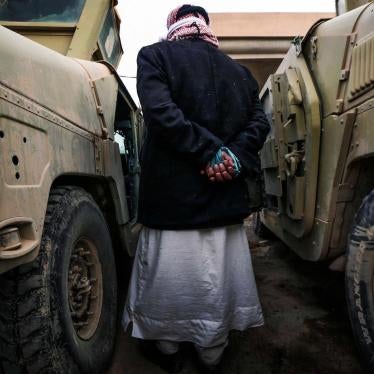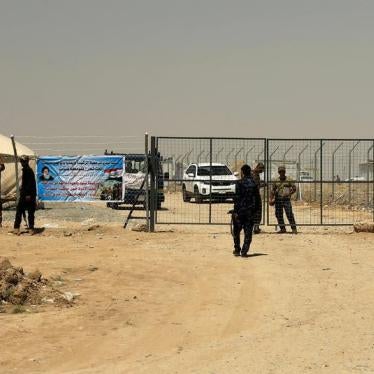As the battle against ISIS wraps up, Iraqi and KRG forces are screening, charging and convicting thousands of people, mostly men and boys, for ties to ISIS, under counterterrorism legislation that calls for harsh sentences including the death penalty or life in prison.
ISIS posed a serious security risk to the Iraqi state, including its attacks against civilians and other criminal acts throughout the country. Authorities are right to prosecute these crimes to protect the security of the population and to ensure justice for the victims. However, Iraqi and KRG judges have told me that there is no national strategy to coordinate these prosecutions or to prioritize prosecuting the people responsible for the most serious crimes. The way these trials are being handled is robbing victims of some of this decade’s worst abuses of their day in court.
The desire for punishment and revenge from the families who suffered abuses under ISIS for up to three years is palpable. But the current approach instead risks sowing the seeds of future grievances.
The counterterrorism law allows judges to bring charges against a wide range of suspects, including fighters who raped and killed, but also doctors who worked in ISIS-run hospitals or cooks who prepared food for fighters. Charges of violating the counterterrorism laws are often easier to prove than other offenses. All prosecutors need to do is to prove membership in ISIS or participation in the ISIS bureaucracy or fighting forces instead of proving that they committed specific criminal acts – admittedly a challenge given that these crimes took place in the chaos of war.
Human Rights Watch is aware of at least 7,374 ISIS suspects who have been tried or convicted since 2014, including 92 already executed. In these cases, Iraqi and KRG courts are lumping together those who carry out, participate, plan, finance, or enable terrorism, some in trials that last as little as 15 or 20 minutes, without any victims of their alleged crimes present.
But relying on counterterrorism laws makes it hard to prioritize and punish the most serious crimes under ISIS. And some people should not be prosecuted under any circumstances, such as doctors who were simply doing their job.
The broad counterterrorism prosecutions also make it harder to establish a judicial record of the wide body of crimes committed against Iraqi citizens and to gather the evidence of these crimes from witnesses and victims. While communities have been calling for justice, and trials generally allow for victim and witness participation, authorities are not making any efforts to solicit victims’ participation in the trials. Victims are not being encouraged to attend trials, appear as witnesses, share their accounts of what happened to them, or submit questions for suspects.
One particularly galling example: a defendant admitted during his trial at the Nineveh counterterrorism court that he had held four women as sex slaves, raping a different one each night. But the judge only convicted him for ISIS membership. Why didn’t authorities try to find the women he abused, or their families if they are no longer alive, and give them the chance to sit in the courtroom and demand an apology, or at the very least, to see a judge sentence the suspect for the crimes against their daughter or wife?
Even if some of the suspects committed war crimes, crimes against humanity or genocide, they wouldn’t be convicted of those charges in these trials because the charges don’t exist in Iraq’s criminal code. But judges could charge them with a range of other crimes including murder or rape, which would go a long way in helping victims of these crimes feel like justice was done.
The trials are also proceeding with rampant violations of defendants’ rights under international and Iraqi law. We have documented cases in which ISIS suspects say forces held them for months and interrogated them without a lawyer present, sometimes torturing them to extract a confession that they were indeed an ISIS member.
We have spoken to over 100 families whose sons and husbands were taken away during screenings, but who months later have no idea where they are being held. At first they were overjoyed to be free from ISIS. One woman told me: “I wish we had stayed in Mosul and were killed by an airstrike. That is better than living without knowing what happened to my husband.” One four-by-six-meter cell we saw held 114 prisoners who had been there for four months without a single breath of fresh air or chance to stretch their legs.
At the same time, we have spoken to women held as sex slaves, sold over 10 times from man to man, raped over and over. These women tell us that the government cares nothing for their suffering, and is doing nothing to hold the culprits accountable.
Iraq should show that it can use its horrific ISIS chapter for the better. It should show that it, unlike the extremist group, cares about victims, cares about accountability, and cares about the rule of law. To do that it needs to use the law to prosecute to the fullest those who carried out war crimes and crimes against humanity, in trials that meet basic international standards. And it needs to allow victims to take the stand and speak about what they suffered.
For the state to prosecute those cases properly, it should stop wasting resources prosecuting the hundreds of men who provided medical treatment or helped ISIS by making sure Mosul’s water systems and sewage continued to function and go after the war criminals instead.








